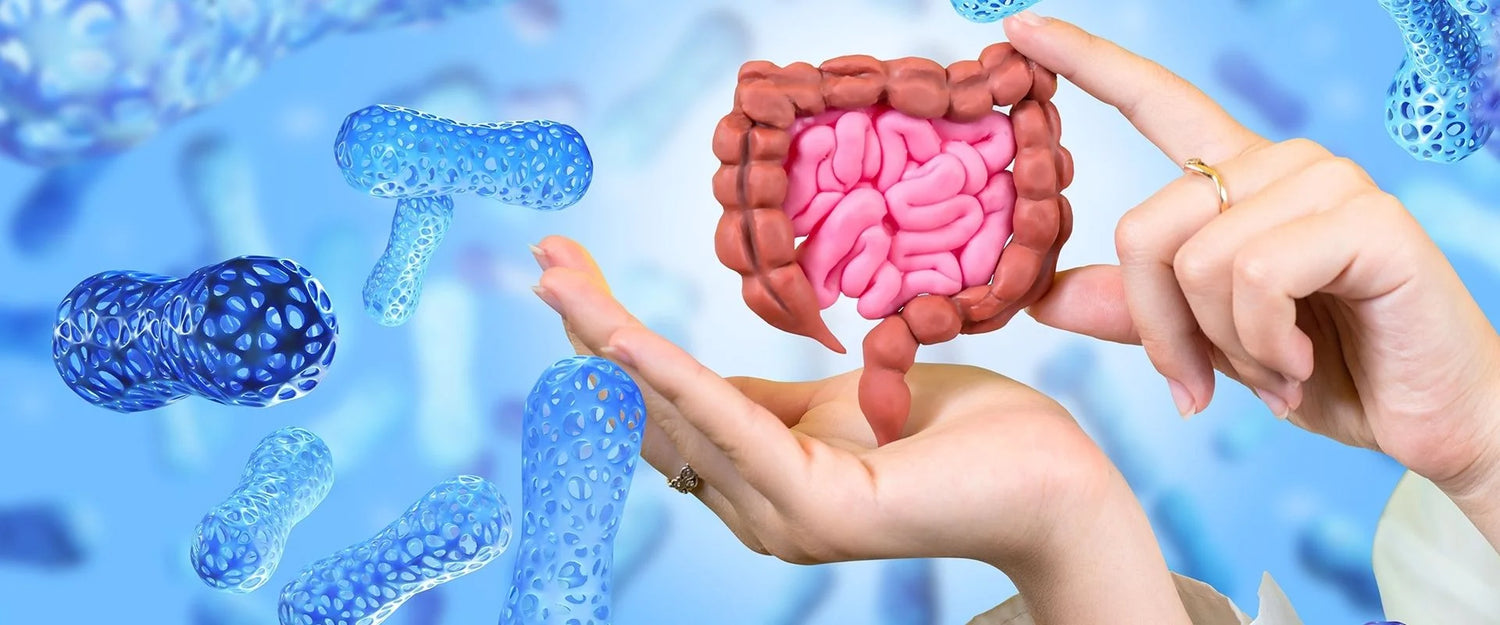Do you believe in your "gut instinct"? If you answered yes, you could be a clairvoyant!! Maybe not to that level but substantially closer when compared to others.
Consider our congested neighbourhoods for a moment. What occurs throughout a typical weekday? People are always rushing to get to work or appointments. Imagine the same scenario on a micro-scale. This will give you an idea of what our microbiome within the body would look like.
The gut has trillions of germs!! Yes, you read it correctly, and these bacteria or "bugs" are made up of thousands of distinct species. Why and what precisely is the question?
These "bugs" coexist peacefully in a healthy person. Their concentration is the highest in our intestines and throughout our bodies. Because they play so many vital functions in supporting our bodies' ordinary daily operations, they are sometimes referred to as our bodies' support systems.
NMN, a vitamin B3 derivative, reduces intestinal barrier permeability and protects the gastrointestinal system. It means that this particular supplement is effective in increasing the number of beneficial “bugs” in our intestines.
NMN also can control the composition of the gut microbiota. This helps in increasing the number of probiotics while decreasing the number of dangerous bacteria. Simultaneously, NMN can raise the percentage of biliary acid-related byproducts in faeces and decrease phenols. NMN could also stimulate mucus production and establish strong linkages.
Gut microbiome
Our gut microbiome is made up of microscopic creatures that are both useful and potentially hazardous. The vast majority of them are beneficial to both human bodies and the microbiota, with just a tiny fraction of them being toxic. In a healthy human, disease-causing and symbiotic microorganisms live happily.
Among them are not only bacteria, but also fungus, viruses, and different parasites. It may appear unhealthy, yet it is quite the reverse!
So, how do we become ill?
The issue arises when that equilibrium is upset, which can be caused by infectious infections, certain diets, or long-term use of antibiotics or other bacteria-killing medications. As a result, the body's vulnerability to illnesses may worsen.
The bacteria that inhabit our gut during our twenties constitute a less and smaller part of the microbiome in healthy adults. According to research, people who are less healthy have a mostly unchanging microbiota and frequently die young.
People with more diverse gut bacteria have greater activity capability and general agility as they age than those with less distinct gut flora. One of the primary causes of a person's less diversified gut ecosystems was their use of a person's less diversified gut ecosystems was that they used more medicines.
But the actual question is, do these "bugs" help us age more slowly? According to research, a healthy gut may be the key to good ageing.
Understanding a healthy microbiota is important to completely understand the interplay involving our gut microorganisms and the human body. But first, we must comprehend how our body and microbiota communicate, as well as the composition of our microbiome.
How does our body's relationship with our gut microbiota work?
Our gastrointestinal tract includes about 100 trillion bacteria that comprise our microbiome. Scientifically this would make our gut a functioning organ of our body. Though our genetic code contains around 23,000 genes, the microbiota has over three million genetic materials. You may conceive a complicated work and magnify it by 10,000 and still not understand the difference.
These "bugs" subsequently generate a plethora of bioactive compounds that replace various biological system activities. Such byproducts tend to influence our fitness, phenotype, and well-being. Gut microbes impact several aspects of a human's health, including immunological, metabolic, and neurobehavioral traits. Numerous experimental models and human research studies highlight the role of gut bacteria in human welfare at distinct periods of our lives.
A microbiome is just a diverse and incredibly coordinated microbial community that resides in our digestive tract. The disruption of this microbiome has been related to significant host illnesses such as metabolic disorders, cancer, and IBS. Modifications in our gut flora could also have an impact on our emotions and behaviour.
It can, for example, affect our immunological response since our cells depend on a variety of microbial substances for proper development and behaviour. This exemplifies the importance of the human microbiome's interdependent nature.
All the metabolites are produced de novo by our gut microbes, and chemicals produced by us are biochemically controlled by gut bacteria. This includes bioactive components produced by bacteria using our sources of food.
what is our gut microbiome actually made of?
The microbiological constitution of our intestinal microbiota differs based on where we are in our digestive tract.
Merely a few bacterial species are regularly present in our gut and small intestine. In contrast, the bacterial community in our gut is the highest of any ecosystem on the globe. It contains up to 1012 microorganisms per gram of gastrointestinal matter.
Such bacteria constitute approximately 300 and 1000 different types of microbes. Nonetheless, around 30 or 40 genera represent 99 percent of all bacteria. This is the evidence of their enormous abundance inside our gut.
Gut microbiota also contribute to around 60% of the entire bulk of our faeces. In addition to bacteria, human gut flora comprises fungi, protists, archaea, and viruses, although little is known about them.
NMN and Gut health

When NMN was administered to model organisms it showed reduction of inflammation. NMN affected the mass, size of the gut and the gut-architecture. NMN also influenced the mucosal layer and cytokine concentrations in such clinical trials. Such findings show that NMN might possibly be used to alleviate irritable bowel symptoms.
NMN might not entirely treat inflammatory bowel conditions. Then what could it do? NMN can slow its progression and alleviate discomfort caused by the disease. This will indirectly boost the gut diversity and protect it from unprecedented damage.
Our gut microbiome is important for the integrity of intestinal epithelium cells. Why? Because it influences cell death and regeneration of gut-epithelial cells.
These “bugs” also influence the production and activity of junction peptides. The tightening of junctions strengthens the effectiveness of intestinal roadblocks (protective wall).
An experiment was conducted by Huang et al. (2021) (2) which showed the following effects of NMN
1. When the quantity of gut microbiome was examined at the taxonomic levels, NMN might increase the number of
- Firmicutes
- Verrucomicrobia
- Actinobacteria
2. NMN decreased the amount of Bacteroidetes
3. Furthermore, NMN showed positive influences in might boosting the abundance of the following- Akkermansia
- Lactobacillus
4. NMN decreased the frequency of Muribaculaceae (unclassified)
Firmicutes, Lactobacillus, and other bacteria that grew following NMN administration may play essential roles in the formation of fatty acids like acetic acid, propanoic acid, and butyric acid.
In conclusion,
Each individual has a distinct DNA or footprint, and our gut microbiota is no different. The volume of microbial cells within our bodies is many orders of magnitude bigger than that of the human cells.
Hence, they contribute more unique genes than our genome and have a considerable impact on our nutrition and physiology.
The major purpose of gut microbiota is to assist the human host in breakdown of food. These microorganisms have an impact on human digestion and aid in the breakdown of difficult and sometimes poisonous dietary molecules.
The gut microbiota in children digests breast milk and disintegrates healthy carbohydrates that are necessary for development. Several bacterial species aid in the digestion of fibre, which really is important not just for gut health but also for preventing weight gain, diabetes, heart disease, and cancer risk.
Our gut microbiota can have both positive and negative roles in fat loss. Bacteria that multiply quickly, like Prevotella, have been related to weight reduction. Such bacteria eat extra nutrients through meals than slower-growing microbes, offering very little for adult weight gains.
Our immune system is also stimulated by the gut flora. These microorganisms can interact with our immune system through the use of certain enzymes and antigens. Thus, in response to an infection, the beneficial microorganisms, or probiotics, in our gut microbiome can activate and enhance our immune system.
NMN administration may play essential roles in impacting the mass, size of the gut and the gut-architecture. NMN also successfully positively influenced the diversity of our gut thereby promoting health and longevity.
At Decodeage (3), NMN is obtained from UTHEVER (3) and guarantees the highest quality in the industry. It is also very pure, with a purity of 99% or more. The FDA has also authorised NMN. Inspection authorities have also certified us for high-purity raw materials. We also conduct heavy metal testing to ensure that none of the ingredients contain heavy metals and that they are safe for consumption. DecodeAge recommends the usage of NMN and offers three different dosages of the same (250 mg, 500 mg and 1000 mg)
The optimum time to take an NMN supplement is in the morning, right after your first meal. It has been discovered that young individuals should take NMN six hours after they get up. For the greatest outcomes elderly people should take it at midday for the best results.
Read more at;
- Huang P, Wang X, Wang S, Wu Z, Zhou Z, Shao G, Ren C, Kuang M, Zhou Y, Jiang A, Tang W. Treatment of inflammatory bowel disease: Potential effect of NMN on intestinal barrier and gut microbiota. Current Research in Food Science. 2022 Jan 1;5:1403-11.Available at: https://www.sciencedirect.com/science/article/pii/S2665927122001289
- Niu KM, Bao T, Gao L, Ru M, Li Y, Jiang L, Ye C, Wang S, Wu X. The Impacts of Short-Term NMN Supplementation on Serum Metabolism, Fecal Microbiota, and Telomere Length in Pre-Aging Phase. Frontiers in nutrition. 2021;8. Available at: https://www.frontiersin.org/articles/10.3389/fnut.2021.756243/full
- 3. NMN UTHEVER 1000 - world's best and purest NMN supplement to boost NAD+ [Internet]. DecodeAge. [cited 2022Nov21]. Available from: https://decodeage.com/products/nmn

















1 comment
Danni
Great article. I’ve been using this product as well as backing it up with Gut Health Apex made with Kakadu Plum.
Leave a comment
All comments are moderated before being published.
This site is protected by hCaptcha and the hCaptcha Privacy Policy and Terms of Service apply.